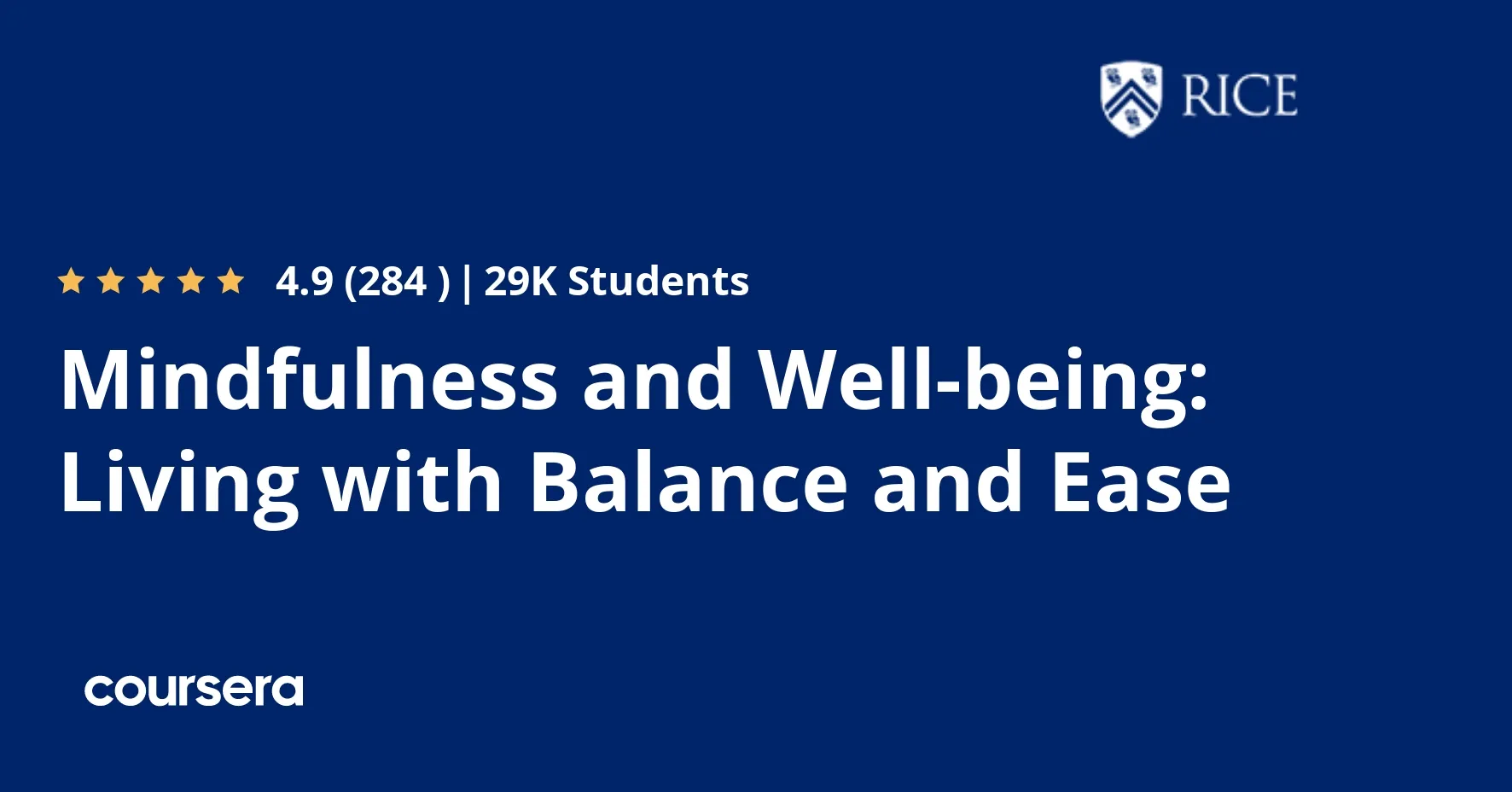
Mindfulness and Well-being: Living with Balance and Ease 
This course builds on Foundations of Mindfulness, exploring the fundamental concepts, principles, and practises of mindfulness to help participants live with balance and ease. Through this course, participants will gain the skills to cultivate a mindful lifestyle. ▼
ADVERTISEMENT
Course Feature
![]() Cost:
Cost:
Free
![]() Provider:
Provider:
Coursera
![]() Certificate:
Certificate:
No Information
![]() Language:
Language:
English
Course Overview
❗The content presented here is sourced directly from Coursera platform. For comprehensive course details, including enrollment information, simply click on the 'Go to class' link on our website.
Updated in [March 06th, 2023]
This course, Mindfulness and Well-being: Living with Balance and Ease, is designed to help participants improve their attentional control, sustained focus, and presence. Through a combination of lectures, discussions, and experiential activities, participants will gain an understanding of the mind/body connection and how the body serves as a direct portal to presence.
The course will begin with an introduction to mindfulness and its benefits, followed by an exploration of the neuroscience of mindfulness and how it can be used to improve well-being. Participants will learn how to cultivate mindfulness through various practices, such as mindful breathing, mindful movement, and mindful eating. They will also explore the concept of self-compassion and how it can be used to cultivate a sense of balance and ease.
In addition, participants will learn how to use mindfulness to manage stress and anxiety, as well as how to use it to cultivate positive emotions and relationships. They will also explore the concept of “flow” and how it can be used to enhance performance and creativity.
Throughout the course, participants will have the opportunity to practice and discuss the various mindfulness techniques and concepts. They will also have the opportunity to reflect on their experiences and share their insights with the group.
At the end of the course, participants will have a better understanding of the mind/body connection and how mindfulness can be used to improve well-being. They will also have the tools and skills to cultivate mindfulness and self-compassion in their daily lives.
[Applications]
After this course, participants can apply the concepts and practices learned to their daily lives. They can use mindfulness to improve their attentional control, sustained focus, and presence. They can also use the mind/body connection to deepen their understanding of how the body serves as a direct portal to presence. Additionally, participants can use the course to develop compassion for themselves and others.
[Career Paths]
1. Mindfulness Coach: Mindfulness coaches help individuals develop their mindfulness practice and apply it to their daily lives. They provide guidance and support to help individuals become more aware of their thoughts, feelings, and behaviors. As the demand for mindfulness-based interventions continues to grow, the need for qualified mindfulness coaches is also increasing.
2. Mental Health Counselor: Mental health counselors provide counseling and therapy to individuals, couples, and families. They help individuals develop coping skills to manage stress, anxiety, depression, and other mental health issues. Mental health counselors are in high demand as the need for mental health services continues to grow.
3. Wellness Consultant: Wellness consultants help individuals and organizations create and implement wellness programs. They provide guidance on how to create a healthy work environment, develop healthy lifestyle habits, and promote overall wellbeing. As the focus on health and wellness continues to grow, the demand for qualified wellness consultants is also increasing.
4. Stress Management Specialist: Stress management specialists help individuals and organizations manage stress. They provide guidance on how to identify and manage stressors, develop healthy coping strategies, and create a healthy work-life balance. As the need for stress management services continues to grow, the demand for qualified stress management specialists is also increasing.
[Education Paths]
1. Bachelor of Science in Psychology: This degree path focuses on the study of the human mind and behavior. It covers topics such as cognitive psychology, social psychology, developmental psychology, and abnormal psychology. It also provides an understanding of the biological and physiological processes that underlie behavior. This degree path is ideal for those interested in pursuing a career in psychology, counseling, or social work. Additionally, the knowledge gained from this degree path can be applied to many other fields, such as business, education, and healthcare.
2. Master of Science in Mindfulness Studies: This degree path focuses on the study of mindfulness and its applications in various contexts. It covers topics such as the history and philosophy of mindfulness, the neuroscience of mindfulness, and the practical applications of mindfulness in areas such as healthcare, education, and business. This degree path is ideal for those interested in pursuing a career in mindfulness-based interventions, such as mindfulness-based stress reduction (MBSR) and mindfulness-based cognitive therapy (MBCT).
3. Doctor of Philosophy in Positive Psychology: This degree path focuses on the study of positive psychology and its applications in various contexts. It covers topics such as the science of happiness, the psychology of resilience, and the practical applications of positive psychology in areas such as healthcare, education, and business. This degree path is ideal for those interested in pursuing a career in positive psychology interventions, such as positive psychology coaching and positive psychology therapy.
4. Master of Arts in Mindfulness-Based Interventions: This degree path focuses on the study of mindfulness-based interventions and their applications in various contexts. It covers topics such as the history and philosophy of mindfulness-based interventions, the neuroscience of mindfulness-based interventions, and the practical applications of mindfulness-based interventions in areas such as healthcare, education, and business. This degree path is ideal for those interested in pursuing a career in mindfulness-based interventions, such as mindfulness-based stress reduction (MBSR) and mindfulness-based cognitive therapy (MBCT).
Course Syllabus
Stress and Mind/Body Systems
Mindful Stress Reduction
Creating and Sustaining Balance in an Unstable World
Achieving Positive Health
Course Provider

Provider Coursera's Stats at AZClass
Discussion and Reviews
0.0 (Based on 0 reviews)
Explore Similar Online Courses

Programming for the Web with JavaScript

Cold Email Marketing Mastery Sales Emails by Coursenvy

Python for Informatics: Exploring Information

Social Network Analysis

Introduction to Systematic Review and Meta-Analysis

The Analytics Edge

DCO042 - Python For Informatics

Causal Diagrams: Draw Your Assumptions Before Your Conclusions

Whole genome sequencing of bacterial genomes - tools and applications

Meditation for Beginners: How to Meditate Deeply & Quickly

Meditation for Beginners Without the Fluff!

Learn Meditation - Theory & Practice
 Related Categories
Related Categories
 Popular Providers
Popular Providers
Quiz
 Submitted Sucessfully
Submitted Sucessfully
1. What is the main goal of this course?
2. What is the main benefit of this course?
3. What is the main focus of this course?


Start your review of Mindfulness and Well-being: Living with Balance and Ease